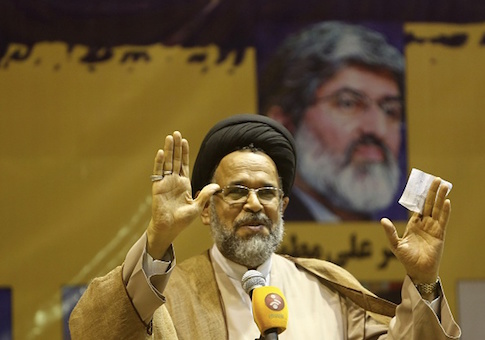Iran maintains a network of spies and lobbyists who clandestinely push the Islamic regime's agenda in Washington, D.C., and elsewhere, according to the head of Iran's ministry of intelligence, who touted the pro-Iran network's ability to spread its ideology to the West.
Mahmoud Alavi, Iran's intelligence minister, in recent remarks independently translated by the Washington Free Beacon, bragged about the Islamic Republic's ability to operate an unnamed "lobby group" in D.C. that helps to push the regime's hardline agenda.
Alavi disclosed that Iranians with dual citizenship in the United States, Canada, and England, remain devoted to the "Islamic revolution" and are working to promote this agenda in their adopted homelands.
In D.C., Alavi claimed, a "lobby group for the Islamic Republic of Iran" is working to bolster the regime's international status and help legitimize its nuclear endeavors.
"They have a lobby group for the Islamic Republic of Iran which does not cost us money," Alavi said, without naming the specific organization. "We should not accuse them and say things that discourage them about the ancestral homeland, this is not good, and losing this capital is not good for the regime."
Iranian dual nationals living in the West remain devoted to the Islamic Republic, he added.
"It is wrong to say that all dual nationals are traitors, spies, or foreign agents; many of dual nationals love Iran, are a capital for Iran," Alavi said. "Many who live in Canada, London, or the United States [are devoted] to the [Islamic] revolution and the supreme leader … In those places some attend religious ceremonies. [Those people] love the [Islamic] Revolution."
While the Iranian official did not name the lobby group in question, the Free Beacon has reported during the past several months that dissident organizations are pushing for a formal investigation into the National Iranian American Council, or NIAC, which has long fought against charges that it lobbies on the regime's behalf.
A group of nearly 100 prominent Iranian dissidents working to undermine the regime petitioned Congress in February to investigate NIAC's ties to the Iranian regime and determine if it is actively helping to push a pro-mullah agenda.
"We write to request a congressional hearing on the efforts of Tehran's theocratic regime to influence U.S. policy and public diplomacy toward Iran," the dissidents wrote to Sen. Bob Corker (R., Tenn.) and Rep. Ed Royce (R., Calif.), the heads of Congress' foreign affair committees, according to copies of the letter first reported by the Free Beacon.
NIAC's actions in favor of the Iran nuclear deal and increased diplomacy with Tehran also raised concerns in January, when the Free Beacon first reported that two high-level Iranian government backers, including a former Islamic Republic official and another accused of lobbying on Tehran's behalf, had been hosted at the Obama White House for more than 30 meetings with top officials.
The meetings came at key points in the Obama administration's outreach to Iran and efforts to push the nuclear deal.
Michael Rubin, a former Pentagon adviser and expert on rogue regimes, raised concerns about Alavi's recent remarks. He noted that organizations pushing Iran's agenda in Washington are obligated to disclose their work under the Foreign Agents Registration Act, or FARA, even if no money is exchanging hands as part of the relationship.
"The question to ask is whether there is daylight between the foreign policy positions of the Islamic Republic and those of groups of which the Iranian intelligence minister refers," Rubin said.
"At the very least, it is worth asking whether any individual who is making a couple dozen meetings to the White House and even more to the State Department is acting as what the Iranian intelligence minister might consider a lobbyist," Rubin added, referring to the former administration's outreach to pro-Iran interests in the United States. "It's not a witch-hunt, it's a matter of law."
Given Alavi's recent disclosures, U.S. officials would be wise to "ask the motivations of those fundraising for any group that seems more interested in defending Iran's ballistic missile work than in human rights and cultural freedom," Rubin said.
Saeed Ghasseminejad, an Iranian dissident and associate fellow at the Foundation for Defense of Democracies, told the Free Beacon that several years ago Iran implemented a formal plan to "strengthen its ties with anti-war and pro-regime lobby groups."
This included bolstering ties with Iranian dual nationals in the West and certain organizations in Europe and the United States to help "change the unfriendly governments' policies and actions regarding the regime," according to Ghasseminejad.
This network is tasked with discrediting Tehran's opponents and stopping efforts to foster regime change in Iran, Ghasseminejad said.
"They are specifically concerned about any prospect of regime-change and cooperation between the U.S government and Iranian opposition groups," he said.
Iran also wants these organizations to promote policies that benefit Iran and will help it garner international legitimacy, according to Ghasseminejad.
